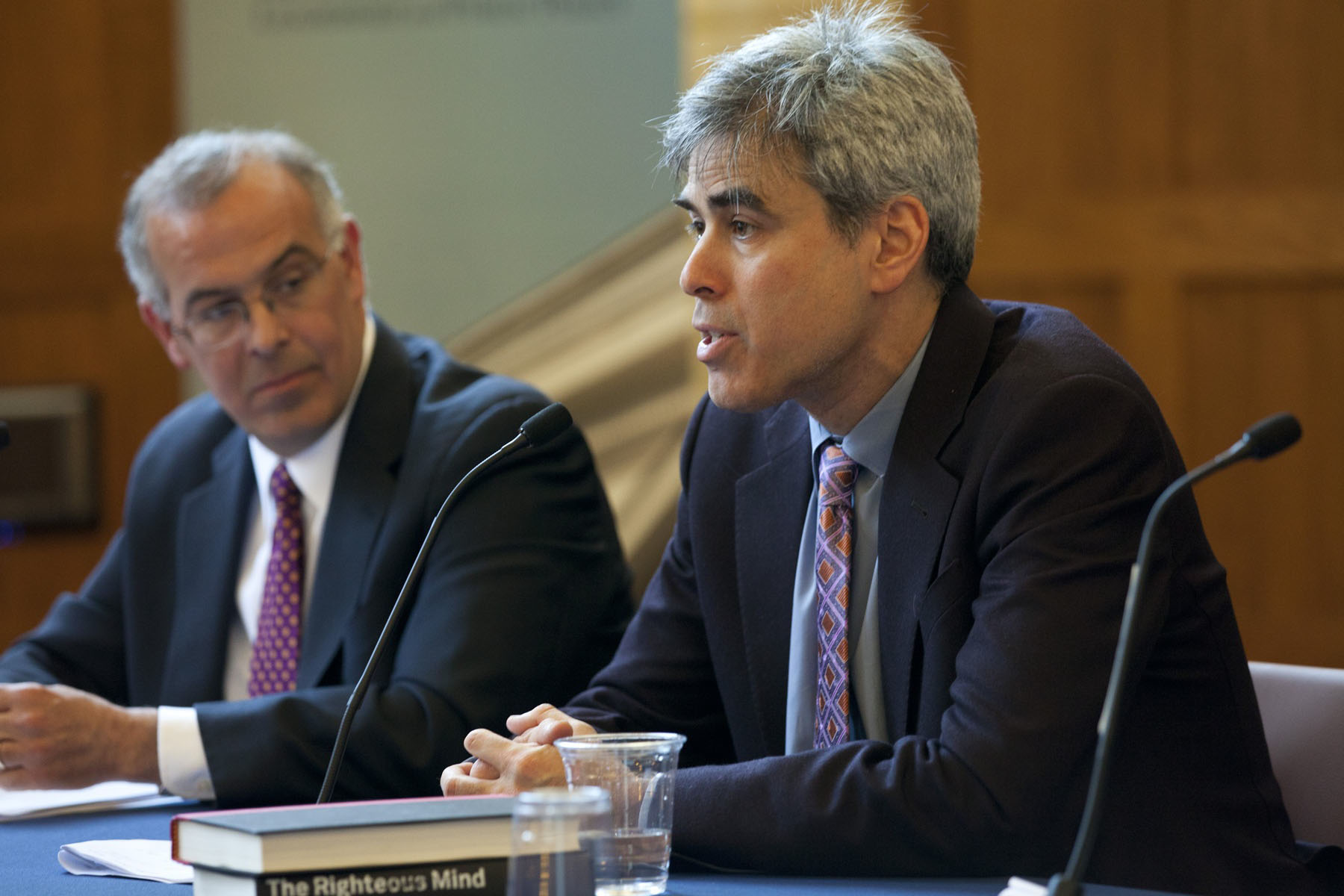University of Virginia professor Jonathan Haidt's new book, "The Righteous Mind: Why Good People Are Divided by Politics and Religion," has been discussed and reviewed in recent weeks on NPR and in national newspapers on both sides of the Atlantic.
He returned to Grounds this week from a visiting professorship in New York to discuss the book in a forum Monday at the Miller Center, and in a friendly debate with New York Times op-ed columnist David Brooks on Tuesday, hosted by the Frank Batten School of Leadership and Public Policy.
The new book "doesn't disappoint," Brooks said, noting that several Times columnists and reporters are vying to be the first on their staff to review the book. "I probably won't win that contest," he said, to laughter among the standing-room only audience of more than 140 in Garrett Hall's Great Hall.
At both events, Haidt – a psychology professor in the College of Arts & Sciences – gave a quick overview of the main points in his new book, which is divided into three parts.
In the first part, Haidt argues that although we like to think that reasoning guides our moral decision-making, actually the mind is divided, like a rider on an elephant (a central metaphor in Haidt's 2006 book, "The Happiness Hypothesis"). "Our conscious reasoning is not really in charge of the elephant of intuition," he said.
In the book's second part, Haidt summarizes his groundbreaking research into the foundations of moral psychology, much of which is based on research done through his team's YourMorals.org website. As a result, Haidt has categorized moral intuitions into six broad categories: care/harm, fairness/cheating, liberty/oppression, loyalty/betrayal, authority/submission and sanctity/degradation – each of which, he theorizes, has evolved to serve a specific purpose vital to human life.
For instance, concern with care/harm is crucial to raising children. Our concern with sanctity/degradation arose in response to the challenge of avoiding contaminated food and guarding against disease.
Cultures differ in how they prioritize or emphasize these six basic moral foundations, he said.
In post-World War II America, he said, both liberals and conservatives are concerned (though in different ways) with the first three moral foundations: care, fairness and liberty. But secular liberals are wary of the last three moral foundations – loyalty, authority and sanctity – which they understand as contributing to war, racism and sexual repression.
"Liberals are ambivalent about these foundations at best, whereas social conservatives embrace them," Haidt said. As a result, conservatives possess "a broader set of moral tastes" and are able, in appealing to the public, to tap a richer moral lexicon.
As a consequence, he said, liberal policymakers should be very careful about enacting policies that violate notions of loyalty, authority or sanctity, like President Obama's recent decision to force churches to pay for health care benefits that include support for birth control.
In the book's third section, Haidt explains how humans evolved a dual nature that includes selfish striving and a nobler "groupishness."
"We are selfish primates who long to be part of something larger and nobler than ourselves. We are 90 percent chimp and 10 percent bee," he said. Good leaders, and calls for shared sacrifice, can activate our community-focused "bee" nature.
Humans gained the capacity to cooperate beyond the bonds of kinship by circling around a shared belief, considered sacred. Shared belief in a moral framework (often guided by religion) binds us together, but also blinds us, Haidt said.
"Morality binds us into ideological teams that fight each other. … It blinds us to the fact that each team is composed of good people who have something to say," he said.
Haidt's book provides "a proper perspective to see the foundational things that shape politics, and shafts of insight into what's going on, how our moral drives are dividing us," said Brooks, who listed off several things he admired about Haidt's work.
"As a conservative, it makes you feel understood," Brooks said, "and feeling understood is the greatest pleasure in the world." He praised how the book reinforces the importance of emotion, social connections and moral sentiments, and brings moral sentiments to the center of how we think about public policy and politics.
The book also emphasizes that political differences are deeper than the talk show controversy of the week. "Those subjects are really a puppet show for the reality going on underneath," he said.
Brooks also had a few criticisms, suggesting Haidt takes too narrow a view of religion.
"Religion is about community building, but that is not the end of it," he said. Religion is also about solitary, incredibly complicated relationships with God.
Brooks explained that his skepticism about the limits of human knowledge made him wary of Haidt's efforts to define a universal system of moral foundations. "What happens with our moral foundations is too multivariate, changes over time, and probably can't be reduced to six categories," he said.
He ended his remarks on a lighthearted, but cautionary, note. "What you believe is less important than how you believe it. If you enter any belief with a sense of contingency, no matter what foundation you believe in, you will probably be a good player in the public space," in contrast to those who bring a sense of absolutism and egotism.
We are entering an age of extreme narcissism and egotism, Brooks warned. In 1950, when high school seniors were asked if they considered themselves a very important person, 12 percent said yes. In 2000 that number was 80 percent. "If you think you are the bee's knees, I don't care what moral foundation you hold to, you're going to be insufferable."
– by Brevy Cannon
Media Contact
Article Information
March 21, 2012
/content/uva-haidt-brooks-debate-nature-morality-and-politics

